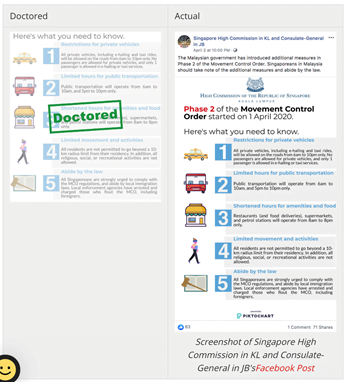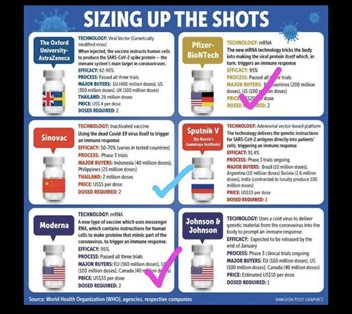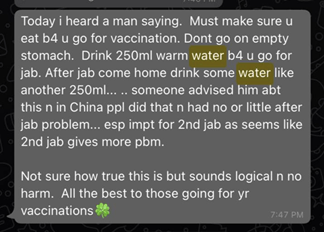Alongside COVID-19, another pandemic has plagued the world: misinformation. Regardless of intention, false, inaccurate, or misleading information spread like wildfire across WhatsApp here in Singapore during the peak of the pandemic last year.
In early 2020, fear and paranoia was at an all-time high, with many people from older generations playing a leading role in spreading the fear. Ms Ng, 55, an accounting executive from Singapore, exchanged a flurry of messages about COVID-19 with her friends and family each day. “Gargle with salt water to keep Covid-19 at bay!”, they read, “Stock up on supplies, Singapore is entering into a lockdown soon!”, and, “The Police are knocking on doors to check for violation of safe distancing measures!”.
None of these claims were true. Gargling with salt water may help to alleviate symptoms of a sore throat, but it does not prevent one from contracting COVID-19. Rumours about a lockdown began swirling in March, but a lockdown was only announced in April. The Police never proactively conducted checks on residences to enforce safe distancing measures.

Yet, fear and paranoia took over, and such falsehoods spread like wildfire. Ng recalls, “I forwarded [these types of messages] because nobody knows how much worse COVID-19 will be, it’s better to be safe than sorry.”
Undercurrents of misinformation have always surged through Singapore’s WhatsApp networks – previous viral claims included fake news about Singapore’s former Prime Minister Mr. Lee Kuan Yew’s death, and non-existent supermarket voucher giveaways – but times of crisis like the pandemic magnify the dangers of misinformation. Most recently, false claims threaten to derail Singapore’s nation-wide vaccination programme.
Recognising the perils of misinformation, the government has pulled out all the stops to bring the misinformation under control. Falsehoods are swiftly debunked with corrections issued on the official gov.sg website, while the government created an official channel on WhatsApp to spread genuine information. WhatsApp has also done its part by imposing limits on the number of times a message can be forwarded at a time, creating more friction and slowing the dissemination of falsehoods.

Despite the multiple barriers erected to curb misinformation, the habit of some users of automatically forwarding news and messages without verifying its authenticity is the most important hurdle to overcome.
Official corrections can be issued, but studies have found that the effectiveness can be limited, and corrections may even backfire, reinforcing people’s deeply entrenched biases. WhatsApp can limit the number of times a message can be forwarded at any point in time, but if a person is determined to spread the word, nothing will stop them forwarding one message at a time.
The problem thus becomes apparent: if we do not put a stop to this behaviour, misinformation will continue to evolve, mutate and become more deadly.
Misinformation often begins with harmless intentions
With Singapore’s nationwide vaccination drive, a second wave of misinformation is threatening to emerge once again. The infographic below from the Bangkok Post has been making its way around WhatsApp, comparing the different types of vaccines available on the market. The source is credible, the facts are accurate – but the issue lies with the seemingly innocuous ticks, marked by the sender, on the infographic. It identifies the vaccines that the sender deems suitable for vaccination, and draws a distinction between the Pfizer-BioNTech and Moderna vaccines, in contrast to the Sinovac vaccines.

Ms Ng received this infographic, and forwarded it on to her friends. “I heard that Sinovac isn’t as safe as the Pfizer and Moderna one that is used in Singapore, so I thought [it would be] better to remind my friends about it”, she said.
She also forwarded a message to her family that recommended drinking warm water before and after the vaccination to prevent any after-effects. To her, the advice “made logical sense” and she “didn’t see any harm in drinking warm water”. Her line of reasoning was simple – if it doesn’t harm others and could potentially help them, then why not?

More often than not, misinformation begins with harmless intentions and is born out of care and concern for our loved ones. But regardless of intention, the widespread dissemination of false, inaccurate, or misleading information has the potential to inflict harm, whether we see it or not.
Drinking warm water before and after vaccination is not expected to cause any significant harm to anyone, but this line of reasoning is not always fail-safe. Spreading the news that Singapore is about to enter a lockdown may be done with the wellbeing of one’s friends and family in mind – to make sure that they have enough supplies to tide through a potential lockdown – but they disregard the potential repercussions on society. Your elderly grandmother wouldn’t have thought that her well-meaning message would build towards collective paranoia that resulted in Singaporeans flocking to the supermarkets to stock up on necessities.
It is instinctual to look out for our loved ones; thinking about the wider implications of clicking “forward” on a well-meaning message isn’t. Hence, as a baseline of defence, fact-checking as an objective measure can go a long way – if we make sure that we only send out factually accurate information, we can avoid unnecessary panic.
Only disseminate accurate information. This seems like a simple task, but for older generations, who aren’t digital native, it might not be so simple, due to the widening digital skills gap between generations.
Misinformation is driven by the digital skills gap
To digital natives, fact-checking might be as simple as a google search. However, for some members of Singapore’s older generation, launching google could be a challenge in itself. My father, who turns 61 this year, still grapples with the steps involved in doing a google search. Despite countless reminders and military-like training – “click on google chrome, type in your question, press enter” – he still hesitates when he has to search for something on the internet. He deliberates between launching Safari and Google Chrome, wondering which is the correct browser to use; to the younger generation, we are well aware that both work equally as well.
Growing up with the internet or growing up in the analogue era makes a big difference in the smallest areas of life. Forgetting that digital tools and technology are not intuitive for the older generation often explains our short-lived patience when trying to help them navigate the digital world. I get exasperated after repeating countlesstimes to my father about how he should do a google search. But casting our frustration aside may well be the first step towards putting a stop to the rampant misinformation that plagues the digital world today.
We often bemoan the “boomers” and their reliance on “WhatsApp University” – a stab at the older generation’s trust and active involvement in sharing unverified information on WhatsApp. However, we can hardly fault them for doing so. They understand that they should not be spreading false information, but the hurdles towards verifying information are simply too great.
Ms Ang, 58, a Transport Technician, frequently forwards messages containing tips on health, and most recently, tips about COVID-19 and vaccination. She told me that she does refrain from forwarding messages that seem inaccurate, but she tends to give it the benefit of doubt because of the obstacles involved in fact-checking.
“Sometimes, the message seems reasonable. Maybe a bit suspicious. But it’s too troublesome to check. So I just send, it gives me a peace of mind.”
Her daughter, Ms. Chua, 23, an undergraduate law student, tries to point out inaccurate messages that her mother sends. As with most of the younger generation, she expressed that she “gets irritated, and [her parents] can tell”.
Ms Ang said in jest, “Yeah, she can get quite impatient. Young people in general are just more impatient. But it will be helpful if she can help to check if the information is correct or not. It’s faster if they help.”
To the older generation, the inertia to delve into fact-checking is just too great because they are less adept at doing so. And for us, our temper runs short when we are repeatedly asked to fact-check on their behalf.
Yet, as the old saying goes: “Give a man a fish and you feed him for a day; teach a man to fish and you feed him for a lifetime”. Teaching the older generation how to navigate the digital world, and equipping them with the skills to independently assess and verify information, will pay dividends in the long run, despite the frustration we might face in the process of teaching them. Ultimately, we want to make sure that the people can call out misinformation themselves, and eventually, we can put a stop to the rampant misinformation circulating on messaging platforms.
In the meantime, while we’re helping teach people how to identify misinformation, we can call out misinformation whenever we see it. With tact, of course.
Ms. Chua told me that calling out misinformation is a tricky affair, especially when the Asian culture of respecting one’s elders is so strongly ingrained in Singapore’s society.
“I do point it out when my mom forwards those messages that are not true. But it’s a bit difficult with relatives, because they are considered our elders after all.”
Nonetheless, Ms. Chua said that she still tries to call out misinformation in her family WhatsApp groups whenever she can, because she worries that her elderly relatives, who may be less discerning, would fully buy into the misinformation.
Speaking of the period in March 2020 when rumours swirled about Prime Minister Mr. Lee Hsien Loong announcing a potential lockdown in Singapore, Ms. Chua recalled that she found it necessary to point out that the various conspiracy theories forwarded to her family group chat, such as a cut in the supply of toilet paper and fresh food with the supposed lockdown, should be taken with a pinch of salt.
“I worried about some of my older relatives because I thought some of them might take it as real and join the stockpiling crowd, and end up exposing themselves to the virus instead.”
Instances like this demonstrate the perils of misinformation. In spite of the frustration we might face, it is worthwhile for us to be more patient when teaching our older family members how to verify information, call it out, and repeatedly discourage them from spreading misinformation on WhatsApp.
The government steps in
The frustration experienced by the younger generation is not going unnoticed – Singapore’s government recognises our frustration as a hurdle in overcoming the growing misinformation perpetuated by the older generation and has stepped in with Digital Clinics. These are essentially one-on-one coaching sessions with a volunteer who will walk the older generation through navigating their smartphones. This could range from something as simple as setting up their WiFi connection, to helping them with “discerning online falsehoods”.

Somehow, when dealing with a stranger, we have a greater capacity for patience – probably because it is rude to show your frustration, the same way it is rude to show your frustration with your colleagues. While there is no limit to the number of times one can visit these free digital clinics, learning to navigate the digital world is like learning a new language – the language of the digital world. As with learning a new language, the most effective path to mastery is to immerse yourself in it. That means walking through each step to fact-check every day – launch the google search engine, type in your question, press enter, look for official sources –and teaching the older generation how tosift out falsehoods amongst the WhatsApp messages they receive, on a daily basis.
For this, external tutoring simply does not cut it – family members will have to take on the commitment to walk this journey with the older generation and guide them, answering the same question 10 times if that is what they need.
Building a culture of inclusiveness
Faced with frustration, it is tempting to lapse into the mindset whereby we find this mission unworthy. But beyond stamping out misinformation, we must invest time, patience, and resources in helping our seniors identify falsehoods, in order to build a culture of inclusiveness.
How we approach the misinformation pandemic among the older generation sets the tone for future actions. While there has been an unprecedented leap in digital skills from the baby boomers to digital natives, the future remains unknown. Especially in today’s digital landscape where technology is constantly evolving, we might find ourselves in their shoes 50 years down the road – our turn will come when we millennials become the new ‘boomers’.



